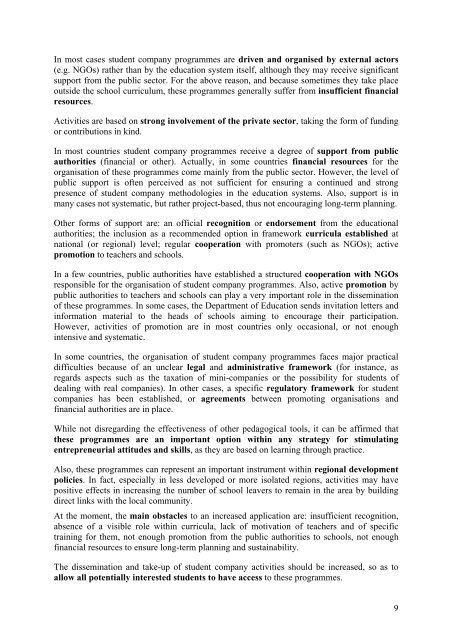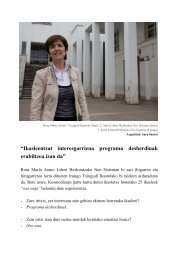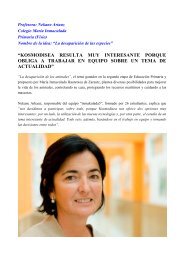Final Report of the Expert Group - European Commission - Europa
Final Report of the Expert Group - European Commission - Europa
Final Report of the Expert Group - European Commission - Europa
Create successful ePaper yourself
Turn your PDF publications into a flip-book with our unique Google optimized e-Paper software.
In most cases student company programmes are driven and organised by external actors(e.g. NGOs) ra<strong>the</strong>r than by <strong>the</strong> education system itself, although <strong>the</strong>y may receive significantsupport from <strong>the</strong> public sector. For <strong>the</strong> above reason, and because sometimes <strong>the</strong>y take placeoutside <strong>the</strong> school curriculum, <strong>the</strong>se programmes generally suffer from insufficient financialresources.Activities are based on strong involvement <strong>of</strong> <strong>the</strong> private sector, taking <strong>the</strong> form <strong>of</strong> fundingor contributions in kind.In most countries student company programmes receive a degree <strong>of</strong> support from publicauthorities (financial or o<strong>the</strong>r). Actually, in some countries financial resources for <strong>the</strong>organisation <strong>of</strong> <strong>the</strong>se programmes come mainly from <strong>the</strong> public sector. However, <strong>the</strong> level <strong>of</strong>public support is <strong>of</strong>ten perceived as not sufficient for ensuring a continued and strongpresence <strong>of</strong> student company methodologies in <strong>the</strong> education systems. Also, support is inmany cases not systematic, but ra<strong>the</strong>r project-based, thus not encouraging long-term planning.O<strong>the</strong>r forms <strong>of</strong> support are: an <strong>of</strong>ficial recognition or endorsement from <strong>the</strong> educationalauthorities; <strong>the</strong> inclusion as a recommended option in framework curricula established atnational (or regional) level; regular cooperation with promoters (such as NGOs); activepromotion to teachers and schools.In a few countries, public authorities have established a structured cooperation with NGOsresponsible for <strong>the</strong> organisation <strong>of</strong> student company programmes. Also, active promotion bypublic authorities to teachers and schools can play a very important role in <strong>the</strong> dissemination<strong>of</strong> <strong>the</strong>se programmes. In some cases, <strong>the</strong> Department <strong>of</strong> Education sends invitation letters andinformation material to <strong>the</strong> heads <strong>of</strong> schools aiming to encourage <strong>the</strong>ir participation.However, activities <strong>of</strong> promotion are in most countries only occasional, or not enoughintensive and systematic.In some countries, <strong>the</strong> organisation <strong>of</strong> student company programmes faces major practicaldifficulties because <strong>of</strong> an unclear legal and administrative framework (for instance, asregards aspects such as <strong>the</strong> taxation <strong>of</strong> mini-companies or <strong>the</strong> possibility for students <strong>of</strong>dealing with real companies). In o<strong>the</strong>r cases, a specific regulatory framework for studentcompanies has been established, or agreements between promoting organisations andfinancial authorities are in place.While not disregarding <strong>the</strong> effectiveness <strong>of</strong> o<strong>the</strong>r pedagogical tools, it can be affirmed that<strong>the</strong>se programmes are an important option within any strategy for stimulatingentrepreneurial attitudes and skills, as <strong>the</strong>y are based on learning through practice.Also, <strong>the</strong>se programmes can represent an important instrument within regional developmentpolicies. In fact, especially in less developed or more isolated regions, activities may havepositive effects in increasing <strong>the</strong> number <strong>of</strong> school leavers to remain in <strong>the</strong> area by buildingdirect links with <strong>the</strong> local community.At <strong>the</strong> moment, <strong>the</strong> main obstacles to an increased application are: insufficient recognition,absence <strong>of</strong> a visible role within curricula, lack <strong>of</strong> motivation <strong>of</strong> teachers and <strong>of</strong> specifictraining for <strong>the</strong>m, not enough promotion from <strong>the</strong> public authorities to schools, not enoughfinancial resources to ensure long-term planning and sustainability.The dissemination and take-up <strong>of</strong> student company activities should be increased, so as toallow all potentially interested students to have access to <strong>the</strong>se programmes.9




